Top Rankings
HOPE Community Academy School District ranks among the top 20% of public school district in Minnesota for:
Category
Attribute
Student Attention
Lowest student:teacher ratio (Top 1%)
For the 2025 school year, there is 1 public preschool serving 478 students in HOPE Community Academy School District. This district's average pre testing ranking is 1/10, which is in the bottom 50% of public pre schools in Minnesota.
Public Preschool in HOPE Community Academy School District have an average math proficiency score of 5% (versus the Minnesota public pre school average of 45%), and reading proficiency score of 20% (versus the 47% statewide average).
Minority enrollment is 100% of the student body (majority Asian), which is more than the Minnesota public preschool average of 42% (majority Hispanic and Black).
Overview
This School District
This State (MN)
# Schools
3 Schools
722 Schools
# Students
779 Students
214,815 Students
# Teachers
74 Teachers
16,916 Teachers
Student : Teacher Ratio
11:1
11:1
District Rank
HOPE Community Academy School District, which is ranked within the bottom 50% of all 522 school districts in Minnesota (based off of combined math and reading proficiency testing data) for the 2021-2022 school year.
Overall District Rank
#503 out of 527 school districts
(Bottom 50%)
(Bottom 50%)
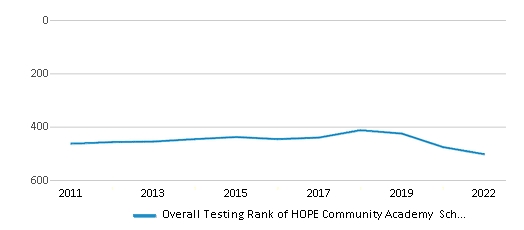
Math Test Scores (% Proficient)
10%
45%
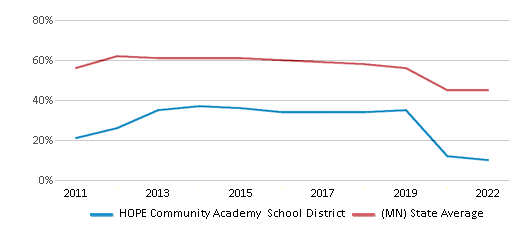
Reading/Language Arts Test Scores (% Proficient)
19%
51%
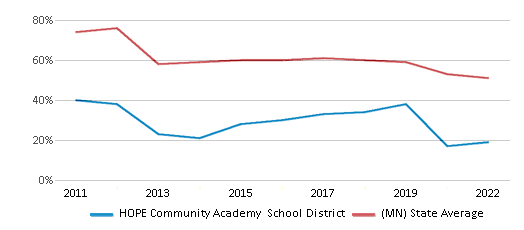
Science Test Scores (% Proficient)
11%
41%
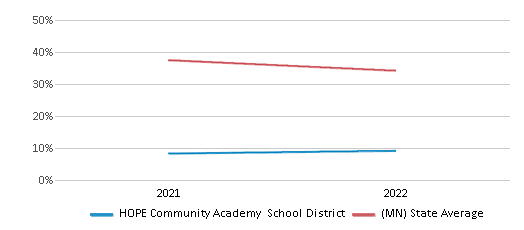
Students by Ethnicity:
Diversity Score
0.12
0.63
# American Indian Students
1 Student
4,606 Students
% American Indian Students
n/a
2%
# Asian Students
730 Students
15,449 Students
% Asian Students
94%
7%
# Hispanic Students
11 Students
28,913 Students
% Hispanic Students
1%
13%
# Black Students
19 Students
27,236 Students
% Black Students
3%
13%
# White Students
7 Students
123,893 Students
% White Students
1%
58%
# Hawaiian Students
n/a
300 Students
% Hawaiian Students
n/a
n/a
# Two or more races Students
11 Students
14,418 Students
% of Two or more races Students
1%
7%
Students by Grade:
# Students in PK Grade:
-
24,443
# Students in K Grade:
77
34,761
# Students in 1st Grade:
76
32,541
# Students in 2nd Grade:
76
32,166
# Students in 3rd Grade:
79
29,034
# Students in 4th Grade:
81
28,343
# Students in 5th Grade:
89
24,163
# Students in 6th Grade:
82
7,122
# Students in 7th Grade:
66
1,002
# Students in 8th Grade:
57
940
# Students in 9th Grade:
36
44
# Students in 10th Grade:
33
46
# Students in 11th Grade:
27
48
# Students in 12th Grade:
-
162
# Ungraded Students:
-
-
District Revenue and Spending
The revenue/student of $12,064 in this school district is less than the state median of $17,854. The school district revenue/student has declined by 27% over four school years.
The school district's spending/student of $12,281 is less than the state median of $18,580. The school district spending/student has declined by 27% over four school years.
Total Revenue
$9 MM
$15,547 MM
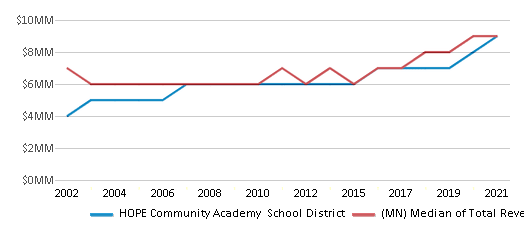
Spending
$10 MM
$16,179 MM
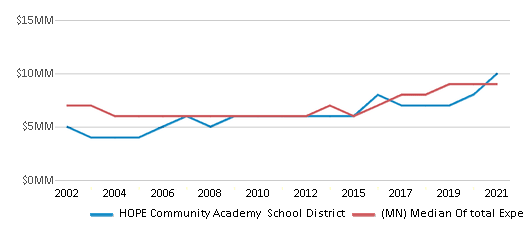
Revenue / Student
$12,064
$17,854
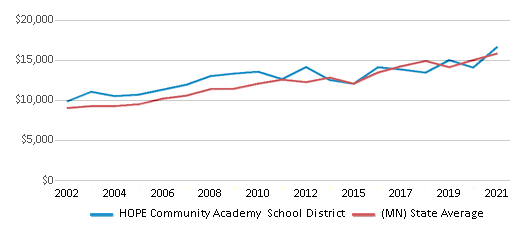
Spending / Student
$12,281
$18,580
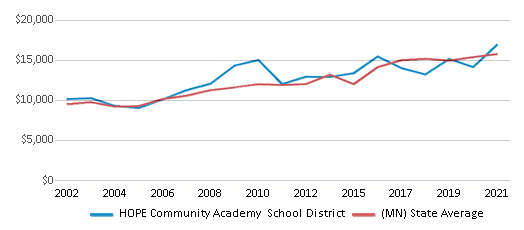
Best HOPE Community Academy School District Public Preschools (2025)
School
(Math and Reading Proficiency)
(Math and Reading Proficiency)
Location
Grades
Students
Rank: #11.
Hope Community Academy Elementary School
Charter School
(Math: 5% | Reading: 20%)
Rank:
Rank:
1/
Bottom 50%10
720 Payne Ave
Saint Paul, MN 55130
(651) 796-4500
Saint Paul, MN 55130
(651) 796-4500
Grades: PK-5
| 478 students
Recent Articles

What Is A Charter School?
Explore the world of charter schools in this comprehensive guide. Learn about their history, how they operate, and the pros and cons of this educational innovation. Discover key facts about charter schools, including admission policies, demographics, and funding, as well as what to look for when considering a charter school for your child.

10 Reasons Why High School Sports Benefit Students
Discover the 10 compelling reasons why high school sports are beneficial for students. This comprehensive article explores how athletics enhance academic performance, foster personal growth, and develop crucial life skills. From improved fitness and time management to leadership development and community representation, learn why participating in high school sports can be a game-changer for students' overall success and well-being.

February 05, 2025
Understanding the U.S. Department of Education: Structure, Impact, and EvolutionWe explore how the Department of Education shapes American education, from its cabinet-level leadership to its impact on millions of students, written for general audiences seeking clarity on this vital institution.





